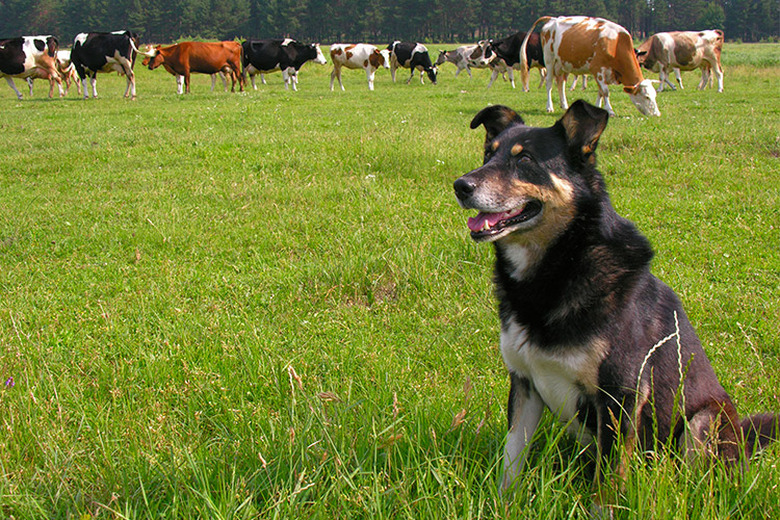The Best Dogs For Herding Cattle
In 1983 the American Kennel Club, or AKC, introduced the herding group. All of the dog breeds in this group are bred and trained to control the movement of livestock and protect them from predators. As of 2013, the AKC recognized 25 breeds as members of the herding group. Non-AKC breeds and mixed breeds can also be strong herding dogs. If a farmer or rancher needs a herding dog, a major consideration is what style of herding best suits his needs. The names of herding dog breeds often reflect the breed's herding style. Herding styles are not exclusive, and many dogs employ all three main herding styles when performing their duties.
Driving
Dogs that specialize in driving move the herd from one location to another without the assistance of the farmer or rancher. These dogs are often called "heelers" because they nip at the heels of the cattle to move them along. Driving dogs can be aggressive in their herding style and may be disruptive to the herd as a result. The Australian shepherd, or "Aussie," is one example of a herding dog trained in the driving style.
Tending
A dog that herds using the tending or boundary style watches over the herd and keeps the livestock close together within a designated area. Tending dogs, such as German shepherds, protect the herd from predators. They may also act as a fence to keep grazing livestock away from a farmer's valuable crops. Tending dogs are especially important if cattle are being grazed in open fields.
Mustering
Border collies are the premier example of a herding breed that uses the mustering style. Although some cattle ranchers may need a mustering dog, this style of herding is more often used with sheep. A mustering dog will hunt down animals that have strayed from the herd or flock and bring them back home. Mustering requires a quiet dog with a gentle touch.
Other Considerations
A farmer should also consider other factors when choosing a herding dog, aside from what herding style suits his needs. Effective herding dogs require training, and some breeds require more intensive and lengthy training than others. Additionally, some breeds are rarer and more expensive than others. The general temperament and reputation of a breed should also be taken into account. Finally, many breeds perform better in certain climates and regions than in others.
By Jennifer Mueller
References
American Kennel Club: AKC Breeds by Group: Herding Group
American Cattlemen: Cattle Dogs: It's a Dog's World
Hobby Farms: Select a Herding Dog for Your Farm
Working Dogs: Herding Style is not a Fashion Statement
About the Author
Jennifer Mueller began writing and editing professionally in 1995, when she became sports editor of her university's newspaper while also writing a bi-monthly general interest column for an independent tourist publication. Mueller holds a Bachelor of Arts in political science from the University of North Carolina at Asheville and a Juris Doctor from Indiana University Maurer School of Law.
